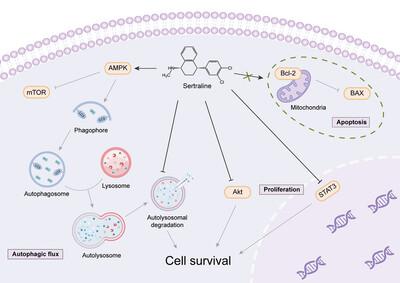通过阻断自噬通量和抑制肿瘤增殖,将舍曲林重新用于治疗结直肠癌
IF 3.7
4区 医学
Q2 PHARMACOLOGY & PHARMACY
引用次数: 0
摘要
结肠直肠癌(CRC)是全球第三大最常诊断出的癌症,也是癌症相关死亡的第二大原因。超过 30% 的 CRC 患者在接受标准治疗后会出现治疗失败和肿瘤复发。因此,发现治疗 CRC 的新疗法非常重要。将现有的临床用药转化为新的抗癌药物是一种可行的方法,并且越来越受欢迎。本研究旨在探讨舍曲林对 CRC 的抗癌作用,并阐明其潜在机制。数据显示,舍曲林在体外和体内对 CRC 均有较强的抗癌作用。舍曲林抑制Akt和STAT3介导的细胞增殖,但不影响CRC中的几种程序性细胞死亡,如细胞凋亡、热凋亡、铁凋亡和有丝分裂。同时,舍曲林可诱导 CRC 细胞中自噬体的积累,但会阻断自噬通量。进一步的研究发现,舍曲林阻碍了 CRC 细胞自噬体降解阶段的后期自噬通量,而不是自噬体与溶酶体融合阶段的自噬通量。此外,研究还表明,舍曲林可协同增敏针对 CRC 的化疗药物。总之,该研究揭示了舍曲林作为一种新型候选疗法治疗 CRC 的巨大潜力,值得在未来进一步开发。本文章由计算机程序翻译,如有差异,请以英文原文为准。

Repurposing Sertraline for the Treatment of Colorectal Cancer by Blocking Autophagic Flux and Inhibiting Tumor Proliferation
Colorectal cancer (CRC) is the third most commonly diagnosed cancer and the second leading cause of cancer‐related death worldwide. More than 30% of CRC patients will experience treatment failure and tumor recurrence after standard‐of‐care treatment. Therefore, it is important to discover new therapeutic regimens for treating CRC. Repurposing existing clinically used drugs into new anticancer agents represents a feasible way and has become increasingly popular. In this study, the aim is to investigate the anticancer effect of sertraline on CRC and to elucidate its underlying mechanism. The data showed that sertraline exhibited a potent anticancer effect against CRC in vitro and in vivo. Sertraline inhibited Akt‐ and STAT3‐mediated cell proliferation but do not affect several programmed cell deaths in CRC, such as apoptosis, pyroptosis, ferroptosis, and mitophagy. Meanwhile, sertraline induced autophagosome accumulation but blocked autophagic flux in CRC cells. Further investigations reveal that sertraline impeded late autophagic flux at the stage of autolysosomal degradation rather than autophagosome‐lysosomal fusion in CRC. Furthermore, it is also demonstrated that sertraline synergistically sensitized chemotherapeutic agents against CRC. Overall, the study reveals the great potential of sertraline as a novel therapeutic candidate for CRC, which is worthy of further development in the future.
求助全文
通过发布文献求助,成功后即可免费获取论文全文。
去求助
来源期刊

Advanced Therapeutics
Pharmacology, Toxicology and Pharmaceutics-Pharmaceutical Science
CiteScore
7.10
自引率
2.20%
发文量
130
 求助内容:
求助内容: 应助结果提醒方式:
应助结果提醒方式:


